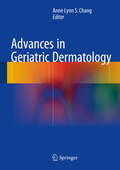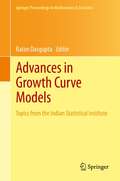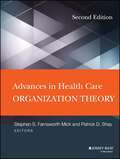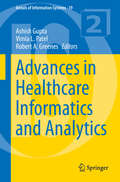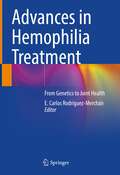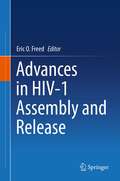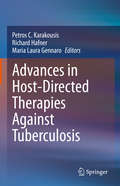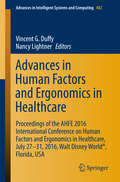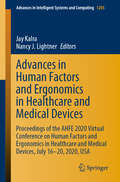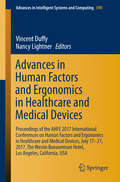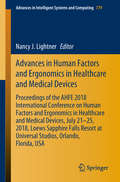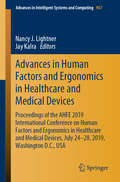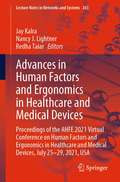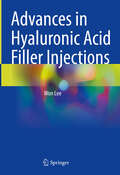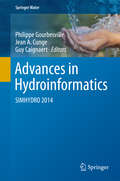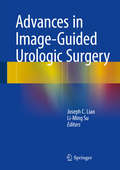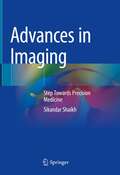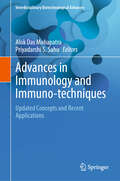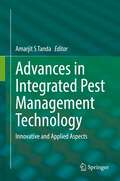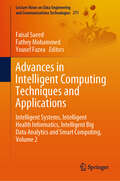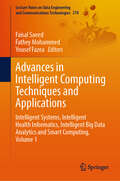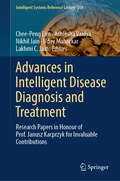- Table View
- List View
Advances in Geriatric Dermatology
by Anne Lynn S. ChangThis concise, easy-to-read book summarizes the current clinical evidence and basic science relating to aging and the skin, assisting the clinician in addressing skin problems in older dermatologic patients. Each chapter focuses on a particular area in which new knowledge has rapidly emerged over the past 5 years, ensuring that the book is completely up-to-date. Recent insights into aging skin from basic and translational science are first discussed, covering the underlying genetics and the potential role of topical agents and procedures in reversing the aging process. Evidence-based prescribing in older patients is then explained, and the evidence relating to treatments for psoriasis, reviewed. Further chapters in Geriatric Dermatology address non-surgical treatment options for basal cell carcinoma, the increase in and management of sexually transmitted diseases in older dermatology patients, and cutaneous signs of elder mistreatment. Case vignettes and informative illustrations assist the reader in quickly grasping the connection between an age-related process and its clinical impact. Geriatric Dermatology is written for dermatologists, research scientists with translational interest, geriatricians, and gerontologists.
Advances in Growth Curve Models: Topics from the Indian Statistical Institute (Springer Proceedings in Mathematics & Statistics #46)
by Ratan DasguptaAdvances in Growth Curve Models: Topics from the Indian Statistical Institute is developed from the Indian Statistical Institute's A National Conference on Growth Curve Models. This conference took place between March 28-30, 2012 in Giridih, Jharkhand, India. Jharkhand is a tribal area. Advances in Growth Curve Models: Topics from the Indian Statistical Institute shares the work of researchers in growth models used in multiple fields. A growth curve is an empirical model of the evolution of a quantity over time. Case studies and theoretical findings, important applications in everything from health care to population projection, form the basis of this volume. Growth curves in longitudinal studies are widely used in many disciplines including: Biology, Population studies, Economics, Biological Sciences, SQC, Sociology, Nano-biotechnology, and Fluid mechanics. Some included reports are research topics that have just been developed, whereas others present advances in existing literature. Both included tools and techniques will assist students and researchers in their future work. Also included is a discussion of future applications of growth curve models.
Advances in H∞ Control Theory: Switched, Delayed, and Biological Systems (Lecture Notes in Control and Information Sciences #481)
by Eli Gershon Uri ShakedAdvances in H∞ Control Theory is concerned with state-of-the-art developments in three areas:the extended treatment of mostly deterministic switched systems with dwell-time;the control of retarded stochastic state-multiplicative noisy systems; anda new approach to the control of biochemical systems, exemplified by the threonine synthesis and glycolytic pathways.Following an introduction and extensive literature survey, each of these major topics is the subject of an individual part of the book.The first two parts of the book contain several practical examples taken from various fields of control engineering including aircraft control, robot manipulation and process control. These examples are taken from the fields of deterministic switched systems and state-multiplicative noisy systems.The text is rounded out with short appendices covering mathematical fundamentals: σ-algebra and the input-output method for retarded systems.Advances in H∞ Control Theory is written for engineers engaged in control systems research and development, for applied mathematicians interested in systems and control and for graduate students specializing in stochastic control.
Advances in Health Care Organization Theory
by Patrick D. Shay Stephen S. MickExplore the evolution of organization theory in the health caresector Advances in Health Care Organization Theory, 2nd Edition,introduces students in health administration to the fields oforganization theory and organizational behavior and theirapplication to the management of health care organizations. Thebook explores the major health care developments over the pastdecade and demonstrates the contribution of organization theory toa deeper understanding of the changes in the delivery system,including the historic passage of the Patient Protection andAffordable Care Act of 2010. Taking both a micro and macro view,editors Stephen S. Mick and Patrick D. Shay, collaborate with aroster of contributing experts to compile a comprehensive volumethat covers the latest in organization theory. Topics include:Institutional and neo-institutional theoryPatient-centered practices and organizational culturechangeDesign and implementation of patient-centered care managementteamsHospital-based clusters as new organizational structuresApplication of social network theory to health care
Advances in Healthcare Informatics and Analytics (Annals of Information Systems #19)
by Ashish Gupta Vimla L. Patel Robert A. GreenesThis important new volume presents recent research in healthcare information technology and analytics. Individual chapters look at such issues as the impact of technology failure on electronic prescribing behavior in primary care; attitudes toward electronic health records; a latent growth modeling approach to understanding lifestyle decisions based on patient historical data; designing an integrated surgical care delivery system using axiomatic design and petri net modeling; and failure in a dynamic decision environment, particularly in treating patients with a chronic disease. Other chapters look at such topics as the impact of information technology integration in integrated delivery systems; operations and supply chain control for inventory management in a health system pharmacy; decision-theoretic assistants based on contextual gesture recognition; evaluating emergency response medical information systems; clinical decision support in critical care; virtual worlds in healthcare; and natural language processing for understanding contraceptive use at the VA.
Advances in Hemophilia Treatment: From Genetics to Joint Health
by E. Carlos Rodríguez-MerchánThis book offers a comprehensive and state of the art overview of hemophilia management by reviewing all most recent advances and cutting edge information in this fast evolving field. As hemophilia patients are often affected by joint problems it also provides clear guidance on the surgical treatment of musculo-skeletal manifestations. The first part is devoted to the disease’s pathophysiology (differentiating hemophilia A and B), genetics, pharmacotherapy – including replacement and non-replacement therapy – and gene therapy, as well as quality of life issues – also related to hemophilia carriers. The second part is then focused on joint problems, ranging from joint health assessment and pain control to surgical treatment of acute hemarthrosis and hemophilic arthropathy, i.e. radiosynovectomy, total joint arthroplasty and arthroscopic joint debridement.Written by experts drawn from leading institutions involved in treatment of hemophilia and related joint problems, this book offers a valuable resource to hematologists, orthopedic surgeons, rehabilitation physicians, radiologists, and pharmacy researchers.
Advances in HIV-1 Assembly and Release
by Eric O. FreedOver the past decade, enormous progress has been made in understanding the late events in the HIV replication cycle. This has been made possible by major advances in cell biology, virology, and structural biology. The field continues to move forward rapidly, with important new discoveries being reported on a regular basis. The impact of this progress across a broad spectrum of biomedical research has been substantial. The increase in basic knowledge in the areas of HIV assembly, release, and maturation has been accompanied by new possibilities for therapeutic intervention.The work includes topics relating to basic molecular biology, cell biology, and structural biology of HIV assembly, coupled with more applied ideas of how this basic information can inform the field of antiretroviral research. The book covers all major topics pertaining to the late stages of HIV replication, with leaders in each area recruited to contribute chapters in their areas of expertise . The topics will be sufficiently focused to allow authors the opportunity to cover the latest developments in detail.
Advances in Host-Directed Therapies Against Tuberculosis
by Petros C. Karakousis Richard Hafner Maria Laura GennaroThis book discusses specific immune cell regulatory pathway(s), immune cell types, or other mechanisms involved in host responses to tuberculosis that can be potentially targeted for host-directed therapy (HDT). The pathways/mechanisms investigated are either protective – thus calling for pathway/factor enhancing drugs – or maladaptive – thus calling for pathway/factor inhibitory drugs. Discovery and development (pre-clinical and clinical) of candidate HDT agents will also be elucidated, as well as approaches for HDT of other diseases. The benefit to the reader will derive from learning about the biology of multiple host pathways involved in health and disease, how these pathways are disrupted or dysregulated during tuberculosis, and which druggable targets exist in these pathways. This book provides the reader with a roadmap of current and future directions of HDT against tuberculosis. Since the host pathways/factors involved in protective or maladaptive responses to tuberculosis are not disease-specific, information learned from the context of tuberculosis likely will be relevant to other infectious and non-infectious diseases.
Advances in Human Factors and Ergonomics in Healthcare: Proceedings of the AHFE 2016 International Conference on Human Factors and Ergonomics in Healthcare, July 27-31, 2016, Walt Disney World®, Florida, USA (Advances in Intelligent Systems and Computing #482)
by Vincent G. Duffy Nancy LightnerAn examination of the various types of human-modeled technology, Advances in Applied Human Modeling and Simulation not only covers the type of models available, but how they can be applied to solve specific problems. These models provide a representation of some human aspects that can be inserted into simulations or virtual environments and facilitate prediction of safety, satisfaction, usability, performance, and sustainability. Topics include: Anthropometry and human functional dataBiomechanics, occupational safety, comfort and discomfort Biometric authentications Driving safety and human performance Enhancing human capabilities through aids or training Fuzzy systems and neural computing Human behavior and risk assessment modeling Integrating software with humans and systems International cooperation in education and engineering research Intelligent agents in decision training Intelligent data and text mining Machine learning and human factors Modeling physical aspects of work Monitoring systems and human decision Psychophysiological indicators of emotion Resilience engineering and human reliability Scenario-based performance in distributed enterprises Special populations Sustainability, earth sciences and engineering System-of-systems architecting and engineering Verification and validation Virtual interactive design and assessmentThe math and science provides a foundation for visualizations that can facilitate decision making by technical experts, management or those responsible for public policy. In considering a systems perspective and decisions that affect performance, these models provide opportunities for an expanded role of engineers and HF/E specialists to meet technical challenges worldwide. They can also be used to improve time-to-market, increase safety and ultimately the effectiveness of an organization. The book focuses on applications of these newly developed models and predictive capabilities useful to human factors and ergonomics engineers, cognitive engineers, human computer interaction engineers, human performance modeling engineers, and students in related fields.
Advances in Human Factors and Ergonomics in Healthcare and Medical Devices: Proceedings of the AHFE 2020 Virtual Conference on Human Factors and Ergonomics in Healthcare and Medical Devices, July 16-20, 2020, USA (Advances in Intelligent Systems and Computing #1205)
by Jay Kalra Nancy J. LightnerThis book explores how human factors and ergonomic principles are currently transforming healthcare. It reports on the design of systems and devices used to improve the quality, safety, efficiency and effectiveness of patient care, and discusses findings on improving organizational outcomes in the healthcare setting, as well as approaches to analyzing and modeling those work aspects that are unique to healthcare. Based on papers presented at the AHFE 2020 Virtual Conference on Human Factors and Ergonomics in Healthcare and Medical Devices, held on July 16–20, 2020, the book highlights the physical, cognitive and organizational aspects of human factors and ergonomic applications, and shares various perspectives, including those of clinicians, patients, health organizations and insurance providers. Given its scope, the book offers a timely reference guide for researchers involved in the design of medical systems and healthcare professionals managing healthcare settings, as well as healthcare counselors and international health organizations.
Advances in Human Factors and Ergonomics in Healthcare and Medical Devices: Proceedings of the AHFE 2017 International Conferences on Human Factors and Medical Devices (Advances in Intelligent Systems and Computing #590)
by Nancy Lightner Vincent DuffyThis book discusses the latest advances in human factors and ergonomics, focusing on methods for improving quality, safety, efficiency, and effectiveness in patient care. By emphasizing the physical, cognitive, and organizational aspects of human factors and ergonomics applications, it presents various perspectives, including those of clinicians, patients, health organizations, and insurance providers. <P><P> The book describes cutting-edge applications, highlighting best practices for staff interactions with patients, as well as interactions with computers and medical devices. It also presents new findings related to improved organizational outcomes in healthcare settings, and approaches to modeling and analysis specifically targeting those work aspects unique to healthcare. Based on the AHFE 2017 International Conference on Human Factors and Ergonomics in Healthcare and Medical Devices, held on July 17–21, 2017, in Los Angeles, California, USA, the book is intended as a timely reference guide for both researchers involved in the design of healthcare systems and devices and for healthcare professionals working to deliver safe and effective health service. Moreover, by providing a useful survey of cutting-edge methods for improving organizational outcomes in healthcare settings, the book also represents a source of inspiration for healthcare counselors and international health organizations.
Advances in Human Factors and Ergonomics in Healthcare and Medical Devices: Proceedings of the AHFE 2018 International Conference on Human Factors and Ergonomics in Healthcare and Medical Devices, July 21-25, 2018, Loews Sapphire Falls Resort at Universal Studios, Orlando, Florida, USA (Advances in Intelligent Systems and Computing #779)
by Nancy J. LightnerThis book shows how human factors and ergonomic principles have been transforming healthcare. It reports on the design of systems and devices to improve quality, safety, efficiency, and effectiveness in patient care, and discusses findings related to improving organizational outcomes in a healthcare setting, as well as approaches for analyzing and modeling those work aspects that are unique to healthcare. Based on the AHFE 2018 International Conference on Human Factors and Ergonomics in Healthcare and Medical Devices, held on July 21–25, 2018, in Orlando, Florida, USA, the book highlights the physical, cognitive and organizational aspects of human factors and ergonomic applications, presenting various perspectives, including those of clinicians, patients, health organizations, and insurance providers. The book is intended as a timely reference guide for researchers involved in the design of medical systems, healthcare professionals managing healthcare settings, as well as healthcare counselors and international health organizations.
Advances in Human Factors and Ergonomics in Healthcare and Medical Devices: Proceedings of the AHFE 2019 International Conference on Human Factors and Ergonomics in Healthcare and Medical Devices, July 24-28, 2019, Washington D.C., USA (Advances in Intelligent Systems and Computing #957)
by Nancy J. Lightner Jay KalraThis book explores how human factors and ergonomic principles are currently transforming healthcare. It reports on the design of systems and devices to improve the quality, safety, efficiency and effectiveness of patient care, and discusses findings on improving organizational outcomes in the healthcare setting, as well as approaches to analyzing and modeling those work aspects that are unique to healthcare. Based on papers presented at the AHFE 2019 International Conference on Human Factors and Ergonomics in Healthcare and Medical Devices, held on July 24–28, 2019, in Washington, DC, USA, the book highlights the physical, cognitive and organizational aspects of human factors and ergonomic applications, and shares various perspectives, including those of clinicians, patients, health organizations, and insurance providers. Given its scope, the book offers a timely reference guide for researchers involved in the design of medical systems, and healthcare professionals managing healthcare settings, as well as healthcare counselors and international health organizations.
Advances in Human Factors and Ergonomics in Healthcare and Medical Devices: Proceedings of the AHFE 2021 Virtual Conference on Human Factors and Ergonomics in Healthcare and Medical Devices, July 25-29, 2021, USA (Lecture Notes in Networks and Systems #263)
by Nancy J. Lightner Redha Taiar Jay KalraThis book is concerned with human factors and ergonomics research and developments in the design and use of systems and devices for effective and safe healthcare delivery. It reports on approaches for improving healthcare devices so that they better fit to people’s, including special population’s needs. It also covers assistive devices aimed at reducing occupational risks of health professionals as well as innovative strategies for error reduction, and more effective training and education methods for healthcare workers and professionals. Equal emphasis is given to digital technologies and to physical, cognitive and organizational aspects, which are considered in an integrated manner, so as to facilitate a systemic approach for improving the quality and safety of healthcare service. The book also includes a special section dedicated to innovative strategies for assisting caregivers’, patients’, and people’s needs during pandemic. Based on papers presented at the AHFE 2021 Conference on Human Factors and Ergonomics in Healthcare and Medical Devices, held virtually on 25–29 July, 2021, from USA, the book offers a timely reference guide to both researchers and healthcare professionals involved in the design of medical systems and managing healthcare settings, as well as to healthcare counselors and global health organizations.
Advances in Hyaluronic Acid Filler Injections
by Won LeeIn this book, we will delve into the latest advancements and discoveries in the field of hyaluronic acid filler injections. Hyaluronic acid filler injection stands out as one of the most frequently performed aesthetic procedures globally. The chapters within will encompass recent technological innovations related to hyaluronic acid fillers, encompassing key aspects such as rheology, cohesiveness, degree modification, NMR data, and information on impurities. Additionally, the book will feature up-to-date techniques for safe procedures employing Doppler ultrasound and explore potential treatments for ocular complications.
Advances in Hydrogen Sulfide Biology (Advances in Experimental Medicine and Biology #1315)
by Yi-Chun ZhuHydrogen sulfide (H2S) has emerged as an important gas signalling molecule in a series of organs/tissues, on the diseases of which it plays protective roles, such as proangiogenic effects in ischemic tissues, antiapoptotic effects in the cardiomyocytes, regularization of fatal arrhythmia in myocardial infarction, amelioration of inflammation in autoimmune diseases, modification of neuronal transmission, increase in sodium excretion from the kidney, and amelioration of insulin resistance, etc. This book focuses on the effect of hydrogen sulfide in cardiovascular system, immune system, nervous system, kidney, as well as on the metabolism of glucose and lipids and regulation of ion channels and so on. This book also provides the advances in the understanding of endogenous H2S metabolism and H2S protein targets, as well as H2S donors. It will benefit researchers in both academics and industry working on the underlying mechanism of H2S field and the future of translational medicine of H2S.
Advances in Hydroinformatics: SIMHYDRO 2014 (Springer Water)
by Philippe Gourbesville Guy Caignaert Jean A. CungeThis book is a collection of extended papers based on presentations given during the SIMHYDRO 2014 conference, held in Sophia Antipolis in June 2014. It focuses on the modeling and simulation of fast hydraulic transients, on 3D modeling, and on uncertainties and multiphase flows. The book explores both the limitations and performance of current models and presents the latest developments based on new numerical schemes, high-performance computing, multiphysics and multiscale methods, and better interaction with field or scale model data. It addresses the interests of practitioners, stakeholders, researchers and engineers active in this field.
Advances in Image-Guided Urologic Surgery
by Li-Ming Su Joseph C. LiaoThis book provides an overview of the current state-of-art in combining advances in biomedical imaging with intraoperative navigation and preoperative planning for urologic surgery. These advances hold great promise in improving diagnostic and therapeutic urologic interventions to improve patient outcomes. Leading experts in this exciting emerging field covers early clinical and pre-clinical applications of optical, ultrasound, cross-sectional and computer-assisted imaging in urologic surgery. Advances in Image-Guided Urologic Surgery provides a unique and valuable resource for audience with clinical and research interest in minimally invasive surgery, endourology, urologic oncology, imaging and biomedical engineering.
Advances in Imaging: Step Towards Precision Medicine
by Sikandar ShaikhThis book covers all the advances in the imaging and elaborates on their applications and advantages. It provides step by step overview of the various advanced imaging modalities like molecular imaging, nano imaging, robotic imaging, stem cell imaging, optical imaging, immunoimaging, etc. It describes the applications of various advanced imaging modalities in pathologies like oncology, infection and inflammation and other conditions and provides the available therapeutic options with the help of these modalities. It also covers the detailed aspects of various modalities like ultrasound, CT, MRI, PET-CT, PET-MRI and other modalities. It includes the detailed explanation of various radiotracers, biomarkers and probes with many applications. Chapters cover detailed information at molecular level. The book is helpful for oncologists, hematologists, surgeons and many other specialists.
Advances in Immunology and Immuno-techniques: Updated Concepts and Recent Applications (Interdisciplinary Biotechnological Advances)
by Alok Das Mohapatra Priyadarshi S. SahuThis book aims to elucidate recent advancements in immunology, presenting a curated selection of topics not typically covered in conventional immunology textbooks. Each chapter features a comprehensive outline, an abstract, a glossary, and relevant figures, making this volume an accessible and user-friendly resource for seeking to enhance their understanding of these subjects. This publication will appeal to university researchers, R&D professionals, and graduate students in immunobiology who wish to update and deepen their knowledge of emerging and applied concepts in the field.
Advances in Integrated Pest Management Technology: Innovative and Applied Aspects
by Amarjit S TandaThe UN's Food and Agriculture Organization defines integrated pest management (IPM) as "the careful consideration of all available pest control techniques and subsequent integration of appropriate measures that discourage the development of pest populations and keep pesticides and other interventions to levels that are economically justified and reduce or minimize risks to human health and the environment. IPM emphasizes the growth of a healthy crop with the least possible disruption to agro-ecosystems and encourages natural pest control mechanisms. "Although this is a concept championed since the 70s, recent advances in agricultural biotechnologies and unfortunately, new problems brought on by global climate change warrant a reevaluation of how IPM can be implemented. This book aims at bringing out a comprehensive collection of information on all aspects of advances in integrated pest management technology in agriculture systems worldwide. The main focus of this book is to address the nano-biotechnology as sustainable solutions, biogenetic insect resistant plants in integrated pest management technology (IPMT), and DNA barcoding of insects and role of protease inhibitors in recent management trends. It also highlights the advances in integrated management of insect pests of stored grains, and use of bee pollinator’s as a livelihood security to the people worldwide. Step-by-step descriptions, accompanied by numerous photographs and schematic drawings, are provided on IPMT under changing climate, and habitat manipulation in crops. This book thus provides a forward-looking foundation for IPMT systems and its use in crop production.
Advances in Integrative Dermatology
by Katlein França Torello LottiAn authoritative overview of contemporary approaches to integrative skin health The popularity of integrative medical treatment of skin disorders has increased significantly in recent years—requiring practicing clinicians to keep pace with continuingdevelopments in dermatological research and methods. Advances in Integrative Dermatology offers a comprehensive survey of this dynamic field, providing up-to-date information on both preventative and therapeutic approaches to skin health. Combining clinical medicine with complimentary treatment plans, integrative dermatology provides an innovative perspective to individual patient care. This essential text explores new research in areas including the effects of stress and pollution on the skin, the importance of high-quality sleep, complementary methods of averting skin conditions, and more. Recognizing the impact skin disorders have on physiological, psychological, and emotional health, editors Katlein França and Torello Lotti illustrate key components of inclusive skin health strategies, such as therapeutic diets and nutritional supplements, topical botanicals, and other complementary therapies. Filling a significant gap in current literature on integrative dermatology, this valuable resource: Answers the common questions asked by patients in real-world dermatology practices Addresses pervasive misconceptions of integrative dermatological methods and principles with evidence-based review of current practices Examines contemporary research in the diagnosis and treatment of dermatological disorders Presents comprehensive treatment options for a wide range of conditions such as rosacea, melanoma, and psoriasis Advances in Integrative Dermatology is an indispensable volume for physicians seeking to incorporate holistic techniques into their practices, expand their knowledge of integrative medicine, and provide the best possible care for their patients.
Advances in Intelligent Computing Techniques and Applications: Intelligent Systems, Intelligent Health Informatics, Intelligent Big Data Analytics and Smart Computing, Volume 2 (Lecture Notes on Data Engineering and Communications Technologies #211)
by Faisal Saeed Fathey Mohammed Yousef FazeaThis book presents the papers included in the proceedings of the 7th International Conference of Reliable Information and Communication Technology 2023 (IRICT 2023) that was held in Pulai Springs Resorts, Johor, Malaysia on 27-28, December 2023. IRICT 2023 is organized by the Yemeni Scientists Research Group (YSRG) and Big Data Center in Universiti Teknologi Malaysia (Malaysia) in collaboration with Association for Information Systems – Malaysia Chapter (MyAIS) and College of Engineering, IT and Environment at Charles Darwin University (Australia). IRICT2023 is a forum for the presentation of technological advances in the field of Information and Communication Technology. The main theme of the conference is “Advances in Intelligent Computing Techniques and Applications”. The book discusses several research topics such as Health Informatics, Artificial Intelligence, Soft Computing, Data Science, Big Data Analytics, Internet of Things (IoT), Intelligent Communication Systems, Cyber Security, and Information System. These papers were presented in three parallel sessions during the two days.
Advances in Intelligent Computing Techniques and Applications: Intelligent Systems, Intelligent Health Informatics, Intelligent Big Data Analytics and Smart Computing, Volume 1 (Lecture Notes on Data Engineering and Communications Technologies #210)
by Faisal Saeed Fathey Mohammed Yousef FazeaThis book presents the papers included in the proceedings of the 7th International Conference of Reliable Information and Communication Technology 2023 (IRICT 2023) that was held in Pulai Springs Resorts, Johor, Malaysia on 27-28, December 2023. IRICT 2023 is organized by the Yemeni Scientists Research Group (YSRG) and Big Data Center in Universiti Teknologi Malaysia (Malaysia) in collaboration with Association for Information Systems – Malaysia Chapter (MyAIS) and College of Engineering, IT and Environment at Charles Darwin University (Australia). IRICT2023 is a forum for the presentation of technological advances in the field of Information and Communication Technology. The main theme of the conference is “Advances in Intelligent Computing Techniques and Applications”. The book discusses several research topics such as Health Informatics, Artificial Intelligence, Soft Computing, Data Science, Big Data Analytics, Internet of Things (IoT), Intelligent Communication Systems, Cyber Security, and Information System. These papers were presented in three parallel sessions during the two days.
Advances in Intelligent Disease Diagnosis and Treatment: Research Papers in Honour of Prof. Janusz Kacprzyk for Invaluable Contributions (Intelligent Systems Reference Library #259)
by Lakhmi C. Jain Chee-Peng Lim Ashlesha Vaidya Nikhil Jain Uday MahorkarThe book delves into innovations in AI and related computing paradigms for disease detection and diagnosis. The collected chapters elucidate the use of a variety of AI and related methodologies to address specific medical challenges. From detecting pancreatic cancer, classifying micro-emboli in stroke diagnosis, to segmenting brain tumours from MRI data, and more, the culmination of these studies underscores the transformative impact AI and digital technologies can have on healthcare, emphasising their potential to enhance medical treatment and improve patient care.
